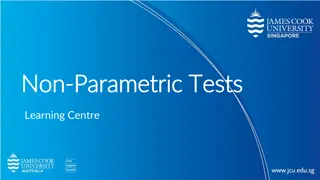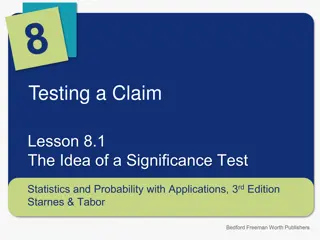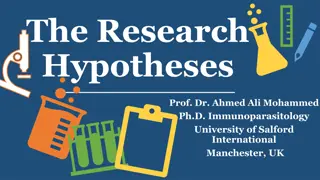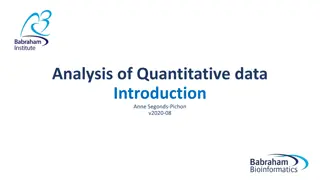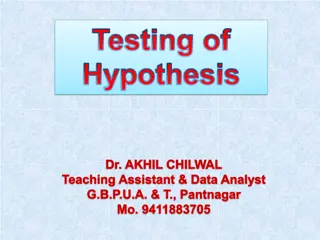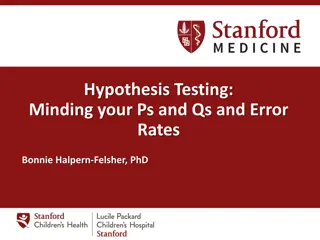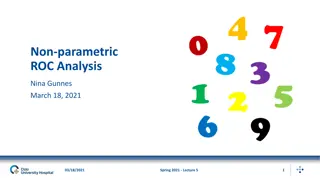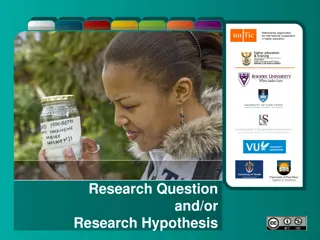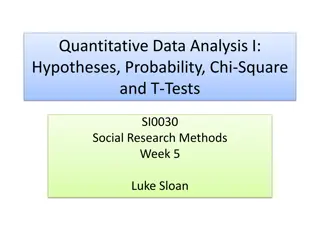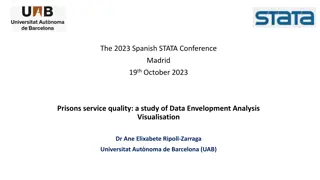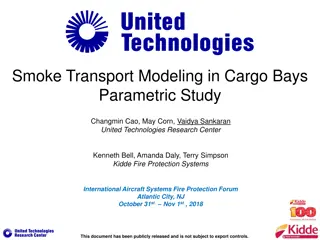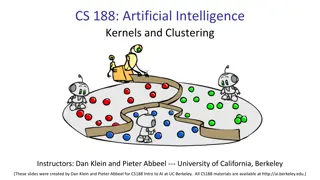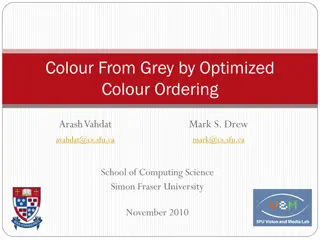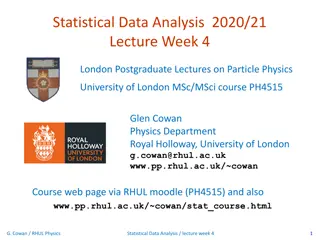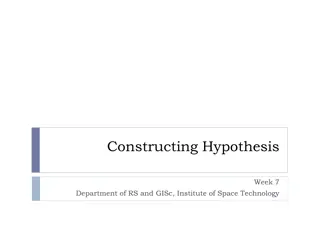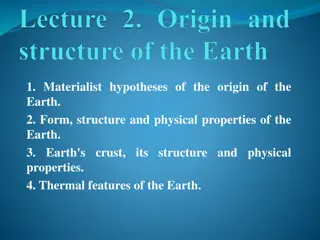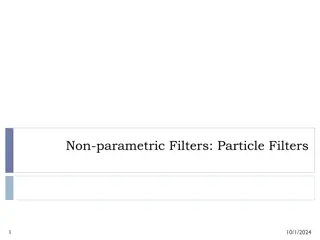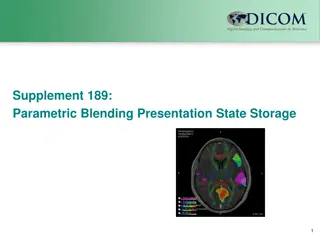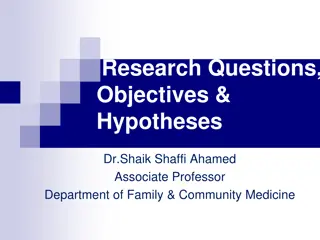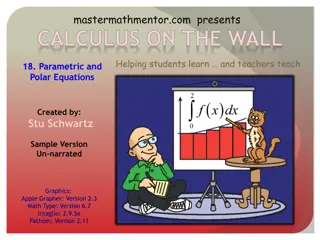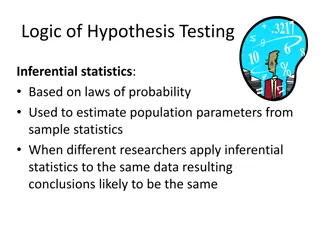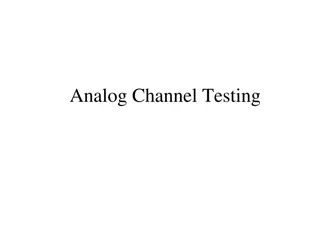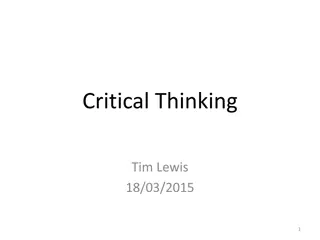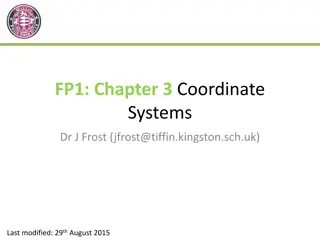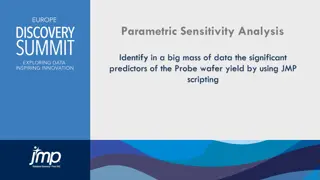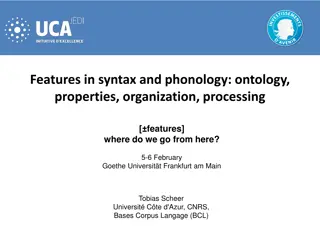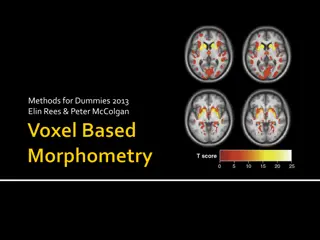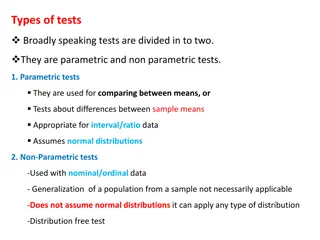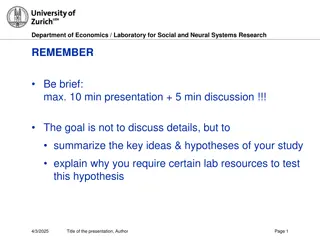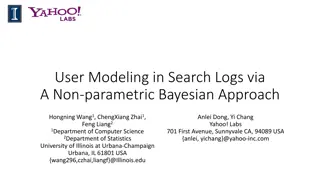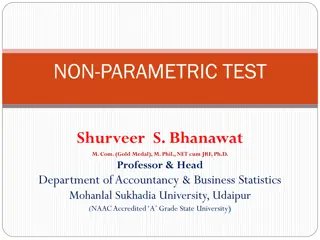Inferential Statistics
Hypothesis testing is a key aspect of inferential statistics, allowing researchers to make conclusions about populations based on sample data. This process involves formulating hypotheses, conducting experiments, and determining the probability of results under different scenarios. By comparing the
2 views • 28 slides
Non-Parametric Tests and Their Applications
Non-parametric tests serve as valuable alternatives to parametric tests when data do not meet specific criteria. This article explores the concept of non-parametric tests, types of non-parametric tests, and provides insights on conducting the Mann-Whitney U Test using SPSS for practical research app
5 views • 32 slides
Significance Testing in Statistics
Significance testing is a vital concept in statistics used to analyze data and make informed conclusions about population parameters. This lesson delves into the significance test procedure, hypotheses formulation, interpreting P-values, and drawing appropriate conclusions based on statistical evide
3 views • 9 slides
Importance of Testable Hypotheses in Scientific Research
Hypotheses play a crucial role in scientific research as they provide a clear statement that can be tested. A genuine research hypothesis must be specific, testable, and falsifiable. It guides researchers in planning studies and helps in determining the outcomes. A good research hypothesis is clear,
1 views • 14 slides
Statistical Inference and Significance in Quantitative Data Analysis
Explore the key concepts of statistical inference, null hypothesis, error types, and the signal-to-noise ratio in quantitative data analysis. Learn about choosing the correct statistical test based on data assumptions, such as parametric tests with specific requirements and non-parametric tests. Gai
0 views • 12 slides
Hypothesis Testing in Statistical Analysis
Statistical analysis aims to make inferences about populations based on sample data. Hypothesis testing is a crucial aspect where decisions are made regarding accepting or rejecting specific values or parameters. Statistical and parametric hypotheses, null hypotheses, and decision problems are key c
2 views • 34 slides
Chi-Square Test in Statistics
Karl Pearson introduced the Chi-Square (X2) test for statistical analysis to determine experimental consistency with hypotheses. The test measures the agreement between actual and expected counts under the null hypothesis, making it a non-parametric test. It can be applied to various types of variab
7 views • 28 slides
Hypothesis Testing in Statistics
Hypothesis testing is essential in scientific inquiry, involving the formulation of null and alternative hypotheses at a chosen level of significance. Statistical hypotheses focus on population characteristics and are tested on samples using probability concepts. The null hypothesis assumes no effec
0 views • 26 slides
Non-Parametric ROC Analysis in Diagnostic Testing
Non-parametric ROC analysis is a crucial method in diagnostic testing to determine the performance of binary classification tests in distinguishing between diseased and healthy subjects. This analysis involves evaluating sensitivity, specificity, positive predictive value, and negative predictive va
14 views • 22 slides
fMRI 1st Level Analysis: Basis Functions and GLM Assumptions
Explore the exciting world of fMRI 1st level analysis focusing on basis functions, parametric modulation, correlated regression, GLM assumptions, group analysis, and more. Dive into brain region differences in BOLD signals with various stimuli and learn about temporal basis functions in neuroimaging
2 views • 42 slides
Effective Guidance on Research Questions and Hypothesis Development
Understanding the importance of formulating clear research questions or hypotheses is crucial for the success of a study. Research questions guide the research process, while hypotheses propose explanations to be proven. This content emphasizes the significance of correctly developing research quest
1 views • 14 slides
Hypotheses, Probability, and Statistical Tests in Social Research
This content delves into formulating hypotheses in social science, selecting statistical tests based on variables' measurement levels, understanding probability in statistical analysis, and distinguishing between null and alternative hypotheses. It emphasizes the research process involving hypothesi
6 views • 21 slides
Creating Coordinate Systems in Creo Parametric
Learn how to create a coordinate system in a specific location and orientation within a Creo Parametric assembly. Follow step-by-step instructions to set external references, activate the desired widget, and redefine the coordinate system without external dependencies. Enhance your design process by
0 views • 11 slides
Efficiency Methodological Approaches in Prisons Service Quality Study
Exploring efficiency methodologies in analyzing prisons service quality, this study focuses on parametric and non-parametric approaches such as Data Envelopment Analysis (DEA) and Stochastic Frontier Analysis (SFA). It delves into benchmarking techniques, productivity analysis, and the implications
1 views • 21 slides
Parametric Study on Smoke Transport Modeling in Cargo Bays
Explore the parametric study conducted by researchers on smoke transport modeling in cargo bays. The study focuses on developing a model-based tool for designing cargo bay detection systems to streamline the certification process. Key components and motivations for characterizing smoke generators ar
0 views • 12 slides
Introduction to Artificial Intelligence Kernels and Clustering at UC Berkeley
Explore the world of Artificial Intelligence through CS188 course slides by Dan Klein and Pieter Abbeel at the University of California, Berkeley. Dive into topics like Case-Based Learning, Nearest-Neighbor Classification, Parametric vs. Non-Parametric models, Similarity Functions, and more. Discove
0 views • 41 slides
Optimized Colour Ordering for Grey to Colour Transformation
The research discusses the challenge of recovering a colour image from a grey-level image efficiently. It presents a solution involving parametric curve optimization in the encoder and decoder sides, minimizing errors and encapsulating colour data. The Parametric Curve maps grayscale values to colou
1 views • 19 slides
Hypotheses and Tests in Statistical Data Analysis
This material covers essential topics on hypotheses and tests in statistical data analysis, including defining hypotheses, critical regions, simple vs. composite hypotheses, and the goal of tests. It emphasizes the importance of critical regions in determining the validity of hypotheses and explores
0 views • 48 slides
Hypotheses in Research: Importance and Development
Hypotheses play a crucial role in research by providing direction, clarity, and focus to a study. They are educated guesses that guide researchers in testing theories and making predictions about the relationship between variables. Developing a hypothesis involves common-sense reasoning, research mo
0 views • 22 slides
Hypotheses on the Origin of Earth and Earth's Formation
Various materialist hypotheses proposed by scientists such as Kant, Laplace, Schmidt, and Fesenkov regarding the origin of Earth and the solar system. These hypotheses suggest different processes, including the formation from primary dusty matter, hot nebula, interstellar meteorite dust, and gas-dus
2 views • 16 slides
Particle Filters in Non-parametric Systems
Particle filters, also known as non-parametric filters, are a powerful tool for state estimation in dynamic systems. These filters represent density using a set of samples drawn from the density, known as particles. Through resampling and reweighting, particle filters track the state of a system ove
2 views • 19 slides
Parametric Blending Presentation State Storage
Explore the concept of Parametric Blending Presentation State Storage, which allows showcasing spatial relationships between parametric maps and structural images while retaining usability. This innovative method involves blending different data sets, applying thresholds, and highlighting important
1 views • 20 slides
Formulation of Research Questions, Objectives, and Hypotheses in Epidemiological Studies
Explore the importance of defining research questions, objectives, and hypotheses in epidemiological research, illustrated through examples from studies on diabetes mellitus in Saudi Arabia. Understand the steps involved in crafting clear objectives and hypotheses to address public health challenges
1 views • 37 slides
Parametric and Polar Equations in Calculus
Dive into the world of parametric and polar equations with insights on graphing, tangents, conversions between polar and rectangular coordinates, and finding the area enclosed by polar curves. Discover the power of these mathematical representations in understanding complex curves and functions.
0 views • 6 slides
Inferential Statistics and Hypothesis Testing in Research
Inferential statistics in research involve estimating population parameters from sample statistics and making decisions based on probability. Researchers follow a set process, starting with preparing for a study, defining variables, stating hypotheses, selecting appropriate tests, analyzing data, an
0 views • 30 slides
Overview of Analog Channel Testing and Parametric Analysis
Explore the world of analog channel testing, types of analog channels, AC parametric tests, gain and level testing, and more. Understand the components involved, critical measurements like absolute voltage levels, and ways to detect circuit defects efficiently. Dive into the nuances of AC circuit pe
0 views • 60 slides
Critical Thinking, Hypotheses, and Arguments
Explore the concepts of critical thinking, hypotheses, and arguments in this informative content. Learn about the definition of hypotheses, the nature of arguments, and syllogisms. Delve into the world of logical reasoning and the foundations of thought processes.
0 views • 32 slides
Coordinate Systems and Conic Sections in Mathematics
This content explores various coordinate systems, conic sections, parametric equations, and Cartesian equations in the field of mathematics. It covers topics such as sketching parametric curves, converting parametric to Cartesian equations, and solving exercises related to parametric equations. The
0 views • 29 slides
Parametric Sensitivity Analysis
In a Silicon-Fab environment, the Parametric Sensitivity Analysis (PSA) algorithm is utilized to determine key performance indicators affecting wafer yield. This method helps identify important predictors amidst noise and outliers in the data, providing a ranked list based on R2 values and P-values.
0 views • 5 slides
Parametric Information in Syntax and Phonology: Features, Organization, Processing
Role of parametric information in syntax and phonology, focusing on features such as tense, aspect, and vocabulary distinctions. Delve into how parametric information impacts computation and language acquisition, distinguishing between merge-created hierarchies and lattices.
0 views • 57 slides
Density Estimation in R: Parametric vs. Non-Parametric Methods
This content delves into the concepts of density estimation in R, comparing parametric methods where a specific form of the density function is assumed known, with non-parametric methods that require no assumption on the distribution's form. Explore topics like maximum likelihood estimation, Bayesia
0 views • 36 slides
Hypothesis Testing in Econometrics
Concepts of null and alternative hypotheses, errors in hypothesis testing, and types of hypotheses in econometrics. Learn how to test the validity of hypotheses using statistical techniques like Chi-Square Test and make informed decisions based on sample results.
1 views • 8 slides
Introduction to Hypothesis Testing
In hypothesis testing, statisticians use formal procedures to accept or reject statistical hypotheses based on sample data compared to population assumptions. Explore the distinctions between parameters and statistics, types of statistical hypotheses, and the significance of null and alternative hyp
0 views • 12 slides
Methods for Dummies 2013: Spatial Normalisation and Registration Techniques
This content delves into the methods described in the book "Methods for Dummies 2013" by Elin Rees and Peter McColgan. It covers various processes such as pre-processing, spatial normalisation, segmentation, modulation, smoothing, statistical analysis, GLM, group comparisons, correlations, longitudi
0 views • 24 slides
Understanding Parametric and Non-Parametric Tests
Parametric tests are used for comparing means with normal distributions, while non-parametric tests are more versatile with different types of data. This includes examples of parametric statistics and the concept of independent t-tests for comparing means between groups. The process of setting up nu
0 views • 42 slides
Understanding Statistical Techniques for Hypothesis Testing
Explore the differences between parametric and non-parametric tests, the conditions under which non-parametric tests are useful, types of data, and how to select a statistical test based on measurement level and sample characteristics.
0 views • 65 slides
Economics Laboratory for Social & Neural Systems Research
Explore the key ideas and hypotheses of a study in the Department of Economics Laboratory for Social and Neural Systems Research, emphasizing the importance of lab resources for testing hypotheses. The presentation covers the research question, necessary SNS Lab resources, experimental design, and s
0 views • 7 slides
Utilizing Non-parametric Bayesian Approach for User Modeling in Search Logs
Explore the utilization of a non-parametric Bayesian approach for user modeling in search logs, focusing on understanding user search intent, query-centric analysis, and mining search logs for valuable insights. Learn about topics such as non-parametric Bayes, click-centric analysis, query categorie
0 views • 34 slides
Statistical Techniques for Hypothesis Testing in Research
Understand the difference between parametric and non-parametric tests, the conditions where non-parametric tests are preferred, the types of data and how to select the appropriate statistical test based on the research requirements. Explore recommended statistical techniques based on measurement lev
0 views • 65 slides
Understanding Hypothesis Testing and its Six Steps
Learn about hypothesis testing, a procedure to determine the likelihood of mutually exclusive statements. Explore parametric vs. non-parametric tests, directional vs. non-directional hypotheses, and the six steps involved in hypothesis testing, including assumptions about the population and sample.
0 views • 23 slides

